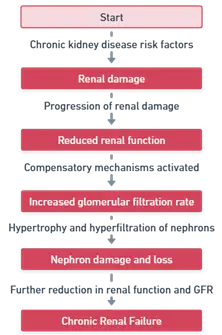- Chronic renal failure, also known as chronic kidney disease (CKD), is a gradual and progressive decline in kidney function that occurs over months to years.
- CKD can eventually lead to end-stage renal disease (ESRD), in which the kidneys are no longer able to function adequately to maintain the body’s homeostasis.
- ESRD requires renal replacement therapy, such as dialysis or a kidney transplant, to sustain life.
Causes of Chronic Renal Failure
- The most common causes of chronic renal failure include:
-
Diabetes Mellitus:
- High blood sugar levels can damage the blood vessels in the kidneys and impair their ability to filter waste products.
-
Hypertension:
- High blood pressure can cause damage to the kidney’s blood vessels and reduce blood flow to the kidneys.
-
Glomerulonephritis:
- Inflammation of the glomeruli, the tiny filtering units in the kidneys, which can result from various causes, such as infections, autoimmune diseases, or drug toxicity.
-
Polycystic Kidney Disease:
- A genetic disorder that causes multiple cysts to form in the kidneys, leading to progressive kidney damage and dysfunction.
-
Chronic Urinary Tract Obstruction:
- Can result from kidney stones, tumors, or an enlarged prostate, causing pressure and damage to the kidney tissue.
Pathogenesis of Chronic Renal Failure (chronic kidney disease)

- Chronic kidney disease progresses through mechanisms specific to its underlying causes:
- Diabetes Mellitus: Prolonged high blood sugar leads to glycation of proteins and increased oxidative stress, damaging the glomeruli and causing diabetic nephropathy.
- Hypertension: Elevated blood pressure causes thickening of renal blood vessels, leading to reduced blood flow and ischemic injury to nephrons.
- Glomerulonephritis: Immune-mediated inflammation damages the glomerular basement membrane, leading to scarring and loss of filtering capacity.
- Polycystic Kidney Disease: Genetic mutations cause cyst formation, replacing normal kidney tissue and reducing function.
- Chronic Obstruction: Increased pressure from urinary blockages leads to hydronephrosis and damage to renal parenchyma.
Advertisements
Symptoms of Chronic Renal Failure
- The symptoms of chronic renal failure often develop gradually and may not become apparent until the disease has progressed significantly.
- As kidney function declines, the following symptoms may occur:
- Fatigue and weakness
- Decreased urine output or increased frequency of urination, especially at night
- Swelling in the legs, ankles, or feet due to fluid retention
- Shortness of breath
- Nausea and vomiting
- Loss of appetite and unintentional weight loss
- Persistent itching
- Muscle cramps, particularly at night
- Anemia, which can cause pallor, dizziness, and rapid heart rate
- Cognitive changes, such as difficulty concentrating or memory problems
- Sleep disturbances, such as insomnia or sleep apnea
- Erectile dysfunction or reduced libido
Treatment of Chronic Renal Failure
-
Blood Pressure Control:
- Use ACE inhibitors or ARBs to lower blood pressure and reduce kidney damage.
-
Blood Sugar Control:
- Maintain good glycemic control in diabetes to prevent further kidney damage.
-
Dietary Modifications:
- Limit protein, sodium, potassium, or phosphorus intake based on individual needs.
-
Medications:
- Prescribe diuretics for fluid retention, phosphate binders for high phosphorus, and erythropoietin-stimulating agents for anemia.
-
Dialysis:
- Use hemodialysis or peritoneal dialysis to remove waste and excess fluid as CKD progresses to ESRD.
-
Kidney Transplantation:
- Consider a transplant for eligible candidates with ESRD, requiring lifelong immunosuppressive medications.

